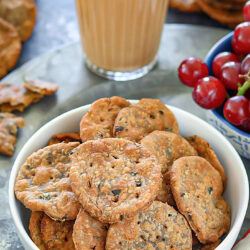And not to mention, they are packed with flavor, delicious, and super addictive!
Crunchy Crispy Savory Made-from-scratch, and is Packed with spinach.
I mean, it’s a win-win for me, as my kids are devouring spinach without a fuss.
Papdi means deep-fried, crispy, round flour crackers mildly flavored with spices when rendered in English. They are most commonly used in chaat recipes like papdi chaat, dahi bhalla, and bhel puri. The best part is they can be devoured on their own as snacks with a cup of tea. Vrat refers to the fasting period in India, and during this timeframe, gluten-free flours, sabudana (tapioca), and certain spices are consumed. And since these papdis are made with gluten-free flour, hence the name vrat ki papdi. The baked vrat ki papdi makes for a perfect low-calorie, guilt-free snack.
Chestnut flour — Also known as s Singhara atta in Hindi, is a gluten-free flour made with water chestnuts. It is a naturally sweet flour that is high in protein, contains dietary fiber, and is low in fat, making it an ideal ingredient for people who are intolerant to gluten. Another substitute for water chestnut flour would be buckwheat flour (kuttu flour) or Almond flour. Tapioca flour — Also known as sabudana flour, is exceptionally smooth in texture, and it adds a nice crispy touch to our papdis. Sabudana is an incredibly versatile ingredient commonly used in India during the fasting months. Another substitute for tapioca flour is arrowroot flour. Spinach leaves — Please use fresh, washed spinach leaves for papdi. The amount of spinach added may look like a lot, but it will be enough once kneaded into the dough. Feel free to replace spinach leaves with any greens of your choice. Seasonings — Just the basics salt, dried mint leaves, and red chili powder to season the papdis. Fat — I have used ghee to knead the dough. Ghee is added to the flour before kneading as it acts as a moyan ( the fat added to the flour while kneading) and lends a crispy texture to our papdis. Oil — for Frying.
Shape the papdi — Divide the dough into 6 equal-sized balls. Take one dough ball and spread the dough into a circle. Use a cookie cutter to cut small rounds out of this circle. Use a fork to prick small holes in the dough to prevent puffing.
Frying the papdis in maintained heat is the secret to the crispiest papdis. Once fried, remove from oil and drain the deep-fried papdis on a paper towel to remove excess oil. Serve them warm with a cup of hot tea.
How to store Gluten-free papdi?
The best way to store this homemade vrat ki papdi is in an airtight container at room temperature. Allow the crispy papdis to cool completely before storing. Fried papdis stay good for about a month at room temperature. If you put a lid on the container while the wafers are still warm, the moisture will make it soft, and the papdis will lose their crunchiness.
To enjoy these papdis as a chaat – spread the papdis in a single layer on a plate. Top them with:
Sauteed boiled potatoes, Green chutney, Toasted peanuts, Chopped green chilies, Yogurt, and enjoy!
You have to savor each bite. As you dig deep into the chaat, you will feel the crunchy texture of papdi, spice from the green chilies, and the tangy flavor from the chutney exploding in your mouth. Impressive, isn’t it! This Vrat ki papdi chaat recipe is loaded with great flavors and will please many tastes buds! Trust me; once you bite into this ultimate indulgence, it will make you feel like you’re eating the regular papdi chaat and not the vrat food – it’s that yummy Should you make this vrat ki papdi, please let me know your thoughts by sharing your comment below. And don’t forget to share it with your family and friends.
Some other yummy vrat recipes that you’ll love –




















































